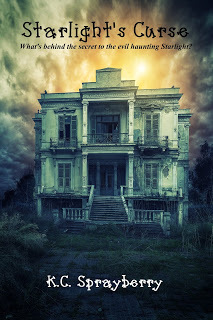K.C. Sprayberry's Blog, page 147
August 14, 2016
Everybody Reads YA ~ Family Curse ... Times Two

Happy “Everybody Reads YA” Sunday! Today I’m sharing an excerpt from my paranormal short story: Family Curse … Times Two. Sometimes, parents keeping secrets cause major trouble.

Cheer camp had ended an hour ago, but Suzanne Courtland, called Zan by anyone who didn’t want her in their face, was still hanging around. She bounced up from the warm metal bleacher and went in search of her boyfriend. Luke “L-Mac” MacGregor was the quarterback for the Landry Wildcats, an uber-cool guy she’d dated for six wondrous, exciting, happy months.
They were the in-couple, the teens others wanted to be. When school began in two weeks, Zan knew everything would be absolutely perfect … if L-Mac would just hurry up.
“What’s taking him so long?”
About the Author
Born and raised in Southern California’s Los Angeles basin, K.C. Sprayberry spent years traveling the United States and Europe while in the Air Force before settling in northwest Georgia. A new empty nester with her husband of more than twenty years, she spends her days figuring out new ways to torment her characters and coming up with innovative tales from the South and beyond.
She’s a multi-genre author who comes up with ideas from the strangest sources. Some of her short stories have appeared in anthologies, others in magazines.

A curse uttered in 1422 sets two families against each other – each side determined to destroy the other. Now, Zan Courtland, unprepared for the task, must face off against her foe – who also happens to be her boyfriend.
Family Curse ... Times Two
Published on August 14, 2016 00:00
August 10, 2016
Natural Dialogue
One of the things I find the most distracting in a book is when dialogue is stilted. Many authors feel they have to follow the rules of not repeating a word in a sentence, or no contractions. They decide their characters must speak as if they are lecturing students rather than talking with friends. The characters then come across as flat, unable to communicate.
Natural dialogue is perhaps one of the hardest things to achieve, especially in books for teens. How is the best way to make your dialogue more natural?
First, don’t attempt to give the reader information not necessary to the current situation through the dialogue. Learn how people actually talk. There are ways to do this and it won’t require you spending much more money than you’re already committed to spending.
Do you commute to your day job on public transportation? Listen to what people are saying around you. Don’t be obvious about it, but pay attention to their speech patterns.
Spend some time at the local mall or in any type of store. Again, don’t just aim for where you have to go and block out those around you. Listen to conversations. Be engaged when someone says hi to you. Think about how each person is speaking in relation to the situation they’re in.
Even our day job can provide you background for dialogue. How about the office gossip? Have you truly listened to what they’re saying? Imagine that instead of being annoyed how this individual is breaking up your work day to pass on the latest scandal, you’re concentrating on their tone of voice, they words they use, how they impart the story. Perfect for a similar type in your book.
Our every day situations will give us the much needed background to create natural dialogue. This will allow your reader to hear the story unfolding in their head rather than thinking that it’s a bit boring or pretentious.
Listen and learn is the best rule of thumb that you can use as you continue your trek to making your book the best it can be.
Published on August 10, 2016 00:00
August 9, 2016
Tension Versus Romance
How does one combine romance with tension in a romantic suspense novel? Aren’t romances supposed to be all sweetness and light, with maybe a moment or two of problems the lovers overcome? Shouldn’t you, the author, be more concerned with getting your couple together for a happily ever after ending?
The secret is to figure out a way to bring the two genres together in a compelling story where the romance is intertwined with the suspense. To allow your characters to be involved with a tense situation while also realizing how attracted to each other they are.
In Starlight’s Curse, Jayme and Brad separated as a couple on the night her daughter allegedly committed suicide. Both still had strong feelings for each other, but neither could move past the horrific act that tore them apart. Jake is driven by what he witnessed forty years earlier and has vowed to figure out the truth of that Christmas Eve night. The three of them work together to uncover the festering evil surrounding a decrepit mansion, while Jayme and Brad finally understand they are too attracted to each other to part again.

Blurb
The discovery of three teenage girls found hanging from an ancient elm tree, alleged suicides, on the grounds of abandoned Starlight Mansion by a teenage boy sets him on a mission to find the truth. Nearly forty years later, now the sheriff, Big Jake finds himself drawn into the investigation of a mysterious “suicide” and the disappearance of another teenager.
Jayme Barclay sees her fifteen-year-old daughter swinging on a rope from a tree at the mansion the county commissioner is turning into a resort. Brad Patterson loses a piece of himself when he answers the 911 call to get to Starlight on a snowy December night.
A year later, the mystery surrounding Tawni's alleged suicide still haunts both Jayme and Brad. Big Jake has been shackled in this investigation, much like another sheriff so many years ago.
Reluctant teens hold back information, until Jayme returns to the hometown she abandoned, to find the truth. Brad hates that he had to intrude on her grief, but also believes this is his chance to redeem himself for not protecting the daughter of the woman he loves. Big Jake suspects who the killer is and that the person isn’t done yet, but must stand back and allow a younger man stand up against a powerful and corrupt group of politicians.
Excerpt
Sleet and snow whipped around Starlight Mansion. A young teen, a mere thirteen-years-old, scampered in and around the tree stumps, scooted around boulders filling a former field where corn had once grown tall, and laughed as the winter storm pelted his face and bare hands. Jake Haskins had no problem with the bitter cold. Not one bit. Even the legends surrounding the long abandoned, decrepit mansion didn’t bother him.
Get Starlight's Curse on Amazon!
Published on August 09, 2016 00:00
August 8, 2016
Being Apolitical
During election cycles, it’s important for an author to maintain a neutral stance. Yes, I can hear everyone now screaming that they have the right to voice their opinions. And I agree with you, but you have to step back and think before you post on social media the latest political slap down against the candidate you don’t like.
What have you just done?
You’ve voiced your opinion. And you may be getting a lot of commentary on both sides of the aisle regarding your post. But have you done yourself, as a public figure, any good?
Absolutely not.
Now, before you rip me to shreds for this assessment, stop and think, which you probably didn’t do before you posted that opinion or shared an article tearing down a candidate.
Did you ever stop to think that your political post just alienated at least half of your fans? Have you considered that while you have your opinion, others may think differently? Most importantly, have you thought about the impact your post will potentially have on your bottom line—sales of your books?
Well? Did you?
I thought not.
I’m sure the excuses abound. You just couldn’t resist an absolutely fabulous post pointing out all the reasons Candidate A is the wrong person for the job. It was so very important that you inform all of your friends and followers of this, so they know how passionate you are about stopping this person from being elected.
Or… It’s important to make sure everyone knows your opinion. You’re a very important author. People will listen to you and follow your lead. Those who don’t aren’t worthy of your time and attention—except those you deem unworthy of you may buy your books. They will be offended by your post, especially if you’re bashing the candidate they’ve chosen. And that means they’re not going to buy your books, because you are slamming their beliefs.
The worst excuse is the “I truly believe” post. You truly believe so much that you don’t bother to research the facts and see if the media or Candidate B’s rhetoric is fully truthful. Or if it’s a sound bite designated to gull as many people as possible.
The biggest reason you should remain apolitical is that after the elections are over, after the winners have celebrated and the losers have promised to come back next stronger and beat the incumbent, you are left with fewer sales, fewer fans, and the feeling that you didn’t accomplish much professionally, even though you felt so passionately about your candidate prior to the election.
Believe as you want. No one is telling you to do otherwise. Believe in freedom of speech, but remember—your social media posts will remain on the internet forever, even if you delete them. Instead of promoting the divisive discord, promote laughter, music, and books. Entice people away from the hatred with your stories and show them that the rest of the world does exist during an election year.
Published on August 08, 2016 00:00
August 7, 2016
Everybody Reads YA ~ The Curse of Grungy Gulley

Happy “Everybody Reads YA” Sunday! Today I’m sharing an excerpt from my paranormal novel: The Curse of Grungy Gulley. One demon against three teens. Who wins?

Random A. Ransom strolled out of the mine. A smile seemed to crack his craggy face. Thunder rumbled in the background, yet no clouds marred the beauty of the deep blue sky. He glanced around at the area outside his entrance into the netherworld and snorted.
“So ugly. I can’t wait until this awful beauty is gone forever.” He laughed, a choking, guttural sound. “Time to get to work.”
About the Author
Born and raised in Southern California’s Los Angeles basin, K.C. Sprayberry spent years traveling the United States and Europe while in the Air Force before settling in northwest Georgia. A new empty nester with her husband of more than twenty years, she spends her days figuring out new ways to torment her characters and coming up with innovative tales from the South and beyond.
She’s a multi-genre author who comes up with ideas from the strangest sources. Some of her short stories have appeared in anthologies, others in magazines.

Faced with the loss of his immortality, Bewitcher Random A. Ransom has to defeat Mary Barron’s young assistants: Tuck Barrons, Earl Lee Farley, and Sue Anne Edwards. Confidant he can beat three kids, Random has no idea that the Johnson triplets have invaded the ranks of his brethren. These brothers have pledged their souls to Archangel Michael to rid the world of evil. What the Bewitcher thought would be easy isn’t so easy after all.
The Curse of Grungy Gulley
Published on August 07, 2016 00:00
August 3, 2016
Emotions
Recently, I stumbled across a post on Facebook about how a kindergarten teacher was proudly exclaiming how she and others in her profession “taught” children to control their emotions. As a parent, I was mildly upset, as I’ve always felt this was my job. As an author, I was horrified.
Why would one be horrified at a child learning to control their emotions.
Simply, without emotions, our books are nothing more than a recitation of the plot we’ve outlined. Oh, we can tell the reader about the character’s emotions. Many people believe that will work rather well. But that’s telling, and writing is all about showing.
To show emotions, our character must be invested in the story line. They don’t receive news in a stoic manner, with an adverb claiming they’re upset or happy. No, they dance for joy or cry tears of loss. They display their emotions for the world to see.
Can you imagine a teenager receiving news that they’ve gotten into the college of their choice and responding with, “Great.” Or would they more than likely be on social media sharing that news with their friends, screaming with joy, and in all ways reacting like a person who has received what they most want.
Yeah, the second option is far closer to the truth than the first.
We are human. That means we’re imperfect and wonderfully, joyfully emotional. We cry for those we lose, laugh out loud no matter where we are when we get good news or hear a great joke. We don’t view world events with a dispassionate eye, but react to the horrors reflected in the news.
Perhaps we should turn to Hollywood to express how emotions should be shown. The ending of An Officer and A Gentleman would have been so disappointing if Zach Mayo, played by Richard Gere, had calmly walked into where Paula Pokrifki, Debra Winger, was working and said, “I love you. Marry me.” And she’d responded with, “Sure,” and then they walked out. Instead of the scene where he strides purposefully into the building, drawing attention from all the other workers there, proposes with his love in his voice, and acknowledges her acceptance by sweeping her off her feet and carrying her out as a crescendo of music accompanies them, with the iconic song Up Where We Belong taking you to the finale. What about Top Gun? Would you have been cheering the end of that movie if Tom Cruise hadn’t given his all to take out the enemy aircraft and overcome the grief he felt for losing Goose? Doesn’t reliving that scene bring You Lost That Loving Feeling by the Righteous Brothers?
The emotions involved there are not contained. They explode and reveal our humanness. They proclaim that we are alive, imperfect, and ready to take on the world.
Published on August 03, 2016 00:00
August 2, 2016
Foreign Locations
What’s more exciting to the reader than a foreign location, especially one, you the author, has visited and knows far more than what’s offered on a website for the area? The mystery and beauty of the area are now available for you to impart to the reader. Local legends and traditions can be worked into your tale, with a minimum of effort. Think of all the colorful adjectives you can use to bring this location alive.
Such is the case in A Long Way From Home. This short story is set in Germany, in the Hühnsreck region during December. The main characters are both members of the U.S. Air Force and assist with the celebration of St. Nicholas Day. Each has their own past to overcome as they aid the local St. Nicholas in bringing gifts to the happy children.
Blurb
Lynn and Deke participate in the local St. Nicholas Day celebration in the German village outside their Air Force Base. Each finds a new reason to enjoy the winter holidays.

Excerpt
Lynn Michaels sat at the window of her dormitory at Hahn AB in Germany. Her gaze focused on everything and nothing—the fat snowflakes so foreign to her, a young woman born and raised in Southern California, the distant memory of what would be happening in her home right at this minute, how she was a long way from home and would never return there. If she could help it.***Deke Richards grabbed several bags of cookies, candy, and small gifts wrapped in festive paper from the table in his dorm room and stuffed them into a backpack. It was supposed to be a cloth sack, but he couldn’t find one at the Base Exchange. He was running late, not an unusual occurrence, and had to hurry if he was to finish everything.
Get A Long Way From Home on Amazon!
Published on August 02, 2016 00:00
August 1, 2016
Publishing Scams
We’re all well aware of the usual publishing scams. The editors, proofreaders, and others who attempt to make big bucks from those of us struggling to publish our books. I don’t mean the hardworking people in those fields, who provide an honest and exceptional service. I’m talking about those who take your money and never seem to have accomplished the task you hired them to do.
The anonymity of the internet makes it very easy for these people to operate, to ply their schemes on the unsuspecting author. Said author may have done their due diligence, but the complaints may not have been filed by those too embarrassed to admit they were scammed or the information may not have been caught by your search engine yet.
A couple of weeks ago, a fellow author asked me about a company that wanted to include one of her romance novels in a box set they would offer. This book has done well but has been available for a little over three years. Their theory was that she would make more money by including it in their box set than she was currently. They even quoted numbers based on what Amazon pays authors for their sales. Sounded too good to be true.
It was too good to be true.
Their quotes were for the sales of the full box set, the work of six authors. Since these books were available for sale already, there was no need for editing and proofreading on the “publisher’s” part. Nor did they have to provide cover art. All they were going to do was put the books up on Amazon as a box set and sell them.
To say my scam radar pinged firmly into the red is an understatement. First, the author in question had her book available through a publisher. This publisher’s contract had a clause about subsidiary rights, which the new publisher didn’t bother to address in their offer. In fact, from the tone of their offer, they weren’t even concerned with any contractual obligations. All they were interested in was getting this author to include her work in a box set and promising sales.
That’s another red ping into the scam radar. No one can guarantee sales. No matter how good a book is, unless you’re a Stephen King or a J.K. Rowling, a Tom Clancy or a Robert Jordan, or any of the other well known authors whose books sell well, you are going to have to work hard for your sales every day. We are all well aware of how difficult it is to attract readers and how much we have to work to keep them happy, yet this was another glossed over area in the offer.
I’m sure by now that you’re wondering just who this publisher is, so you can avoid the pitfall of succumbing to their offer. They are Premier Publishing & Events. (http://www.prempub.com/) and after going over their website, I was amazed to discover that most of their previous publishing experience was strictly in the magazine market. Not satisfied with the information found on the website, I did a bit more research, assisted by my author friend, and we discovered this article in London’s Daily Mirror. (http://www.mirror.co.uk/opinion/money-opinion/p-s-investigates/bogus-premier-publishing-is-behind-cancer-533124)
Turns out my author scam sensor was right on target. So was the scam sensor of my friend. It appears this company has a lot of problems, as indicated by the opening line of the article: “Dodgy “charity” ad boss…” Once both of us had read the article, we knew without a doubt that we’d discovered a new scam method (more than likely new to us, because I don’t think it hasn’t been tried before).
As always, whenever you’re looking for anything to assist you with promoting or publishing your book, you need to do your due diligence. Do the research. Don’t fall for the slick website with promises of instant fame or lots of money. Be wary of what sends tingles up your spine and talk to your friends, to see if they know anything about the place.
Another instance of Author Beware can be located if you are on alert.
Published on August 01, 2016 00:00
July 31, 2016
Everybody Reads YA ~ Grace

Happy “Everybody Reads YA” Sunday! Today I’m sharing an excerpt from my holiday short story: Grace. Family is everything, and so is being together on that one special day.

Grace Winston had celebrated her eighteenth birthday a mere three weeks ago, the same day as Thanksgiving. There were no thanks in her house, no special foods prepared to celebrate her becoming an adult, nothing to mark the day as unique.
Her parents hadn't said "Happy Birthday" until it was time to go to bed. Even then, the acknowledgement had sounded more like "goodnight."
It's not Mama and Papa's fault. They can't help how sad they are. My brothers and sisters should have come like they said they would. They're not even making false promises anymore. All of them claim that they have other plans for Christmas, and we need to get over our selfish desire to have the family together.
About the Author
Born and raised in Southern California’s Los Angeles basin, K.C. Sprayberry spent years traveling the United States and Europe while in the Air Force before settling in northwest Georgia. A new empty nester with her husband of more than twenty years, she spends her days figuring out new ways to torment her characters and coming up with innovative tales from the South and beyond.
She’s a multi-genre author who comes up with ideas from the strangest sources. Some of her short stories have appeared in anthologies, others in magazines.

Grace Winston yearns for one last family Christmas, but she has to convince her brothers and sisters it's worth their while to come home. Her parents, while happy that she's been accepted at Oxford University in England, are pining away for their family to gather together.
She manages to force her older brothers and sister to help out, to come home, but it's up to them to bring the other – a brother who attacked their father to get money to feed his drug habit, and a sister who recently gave up alcohol and is raising four children under the age of five without their daddies. The family does return home, and they surprise their parents, but Grace is soon wondering if this was really worth all the trouble she's gone through, when no one acknowledges her efforts to make this a Christmas to remember … until she receives an early gift that leaves her certain things will turn out all right.
Grace
Published on July 31, 2016 00:00
July 27, 2016
Tags
When I started on this long journey, one of the first things I learned was the difference between a vocal tag and an action tag. It was part of the information I gleaned by reading magazine stories and learning how to properly set up a manuscript for submission.
Lately, there seems to be some confusion as to what is a vocal tag and what is an action tag, and how to properly format them.
Here’s the lesson I learned many, many years ago, and it’s still true today.
A vocal tag uses a word that can be related to either said or asked. Dialogue in this instance is done with a comma, question mark, or exclamation point at the end of the sentence, the closing quotes, and then the tag without capitalization.
An example of this would be: “We’re right on course for adventure,” he said.
It doesn’t appear like this: “We’re right on course for adventure.” He said.
You can add action to the end of that tag. All you have to remember if you’re using said or asked (or one of the many synonyms of those words) is that you need the comma and closing quotes with the tag being in lower case.
One of the bigger problems I’ve seen is making action tags, meaning those tidbits showing what a character is doing, into a vocal tag.
“We can’t get that done,” he laughed, “but we’re sure gonna try.”
No matter how hard you try, you cannot get out a full sentence while you’re laughing. And you probably can’t run and do a whole paragraph of dialogue at the same time. You’d probably not be able to breathe very well.
Action tags are meant to break up the typical said/asked vocal tags. Your character is doing not saying. That means you format them differently.
“I can’t believe he said that.” Kindra smiled. “Do you think he likes me?”
Yes, you can smile and speak at the same time. And many people will claim a smile can say a thousand words. It probably can. But a smile is an action. A smile alone doesn’t say the words, the person does.
“I can’t believe how awful today was.” He flopped onto the bed. “Tomorrow better not be as bad or I’m not getting up!”
Flopped is definitely a word that is all action. The reader will see in their mind’s eye how the young man literally falls backward and expresses his frustration at how the day went. In no way can flopped be considered a vocal tag though.
There are many synonyms for say and ask, and you can use those in your vocal tags if you want to express action or emotion. You might even toss in a few, or more than a few, adverbs to tell the reader what they’re supposed to be feeling (a subject for another day). But instead of being confused about what’s a vocal tag and what’s an action tag, simply think, “Is this word a synonym of ask or said?” If you can’t say that it is, then you must be using an action tag.
Published on July 27, 2016 00:00



